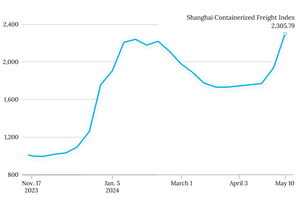U.S. to Increase Tariffs on $18 Billion Worth of Chinese Imports, from EVs to Semiconductors
Listen to the full version

American President Joe Biden has directed his Trade Representative to increase tariffs on $18 billion worth of Chinese imports, including semiconductors, batteries, solar cells and critical minerals, to protect U.S. workers and businesses.
China firmly opposes additional tariffs on Chinese goods, and will take resolute measures to safeguard its rights and interests, the country’s commerce ministry said Tuesday.

Download our app to receive breaking news alerts and read the news on the go.
Get our weekly free Must-Read newsletter.
- DIGEST HUB
- President Biden has directed increased tariffs on $18 billion worth of Chinese imports, impacting goods such as semiconductors, batteries, and solar cells.
- China opposes the tariff increases and plans to take measures to protect its interests, claiming U.S. actions are politically motivated.
- Tariff rates on specific items like steel, semiconductors, and electric vehicles will rise significantly, with further details and exemption requests to be handled by the U.S. Trade Representative.
American President Joe Biden has instructed the Trade Representative to increase tariffs on $18 billion worth of Chinese imports, notably semiconductors, batteries, solar cells, and critical minerals. This move aims to protect U.S. workers and businesses [para. 1]. China strongly opposes these additional tariffs and pledges to take measures to safeguard its interests, as stated by its commerce ministry [para. 2].
The specifics of the tariff increases are as follows: tariffs on certain steel and aluminum products from China will rise to 25% from 0% to 7.5% by this year; tariffs on semiconductors will increase from 25% to 50% by 2025; and on electric vehicles (EVs), from 25% to 100% by 2024 [para. 3]. Lithium-ion batteries for EVs and their parts will see tariffs jump to 25% from 7.5%, and non-EV lithium-ion batteries will face the same hike in 2026. Solar-cell tariffs will increase from 25% to 50% this year [para. 4].
Natural graphite, permanent magnets, and certain critical minerals will have a 25% tariff imposed by 2026. Additionally, ship-to-shore cranes will face a 25% tariff for the first time [para. 5]. Medical supplies like syringes, needles, respirators, and face masks will also face a 25% tariff, with a similar rate applied to rubber medical and surgical gloves by 2026 [para. 6].
The U.S. Trade Representative (USTR) indicated it would provide further details the following week and seek feedback and exemption requests from domestic manufacturers [para. 7]. Biden's announcement comes as part of his intensifying tough stance on Beijing amid his election campaign. Speaking from the United Steelworkers headquarters in Pittsburgh on April 17, he urged USTR Katherine Tai to consider tripling the tariff on Chinese steel and aluminum pending a four-year review. The USTR also announced a 301 probe into China's maritime equipment, logistics, and shipbuilding following a petition from five labor unions [para. 8].
Yang Jianrong, a senior adviser to the Shanghai government, commented on the shifting nature of Sino-U.S. trade disputes, noting a move towards broader, more aggressive administrative tactics amid the U.S. election year. He advised Chinese companies to increase dialogue, innovate, and expand globally in anticipation of increased legal and practical challenges [para. 9].
The USTR began a statutory four-year review of Trump's tariffs on Chinese imports in May 2022. A 193-page report released on Tuesday indicated that the previous tariff round encouraged China to begin eliminating some technology transfer-related practices and reduced U.S. exposure to them. However, some restrictions on U.S. commerce remain, the USTR added [para. 10]. The report also noted a decrease in U.S. imports of goods from China, with increased imports from other sources, including U.S. allies, which potentially bolsters U.S. supply chain diversification and resilience [para. 11].
China's Ministry of Commerce strongly opposed America’s politicization of trade, labeling the U.S. tariffs as driven by domestic political factors. The Ministry criticized the tariff increases as contradicting Biden’s commitments not to suppress or contain China’s development nor to decouple from China. They argue that such moves violate the spirit of consensus reached by the two heads of state and will negatively affect bilateral cooperation [para. 12][para. 13].
- PODCAST
- MOST POPULAR







 Sign in with Google
Sign in with Google
 Sign in with Facebook
Sign in with Facebook
 Sign in with 财新
Sign in with 财新